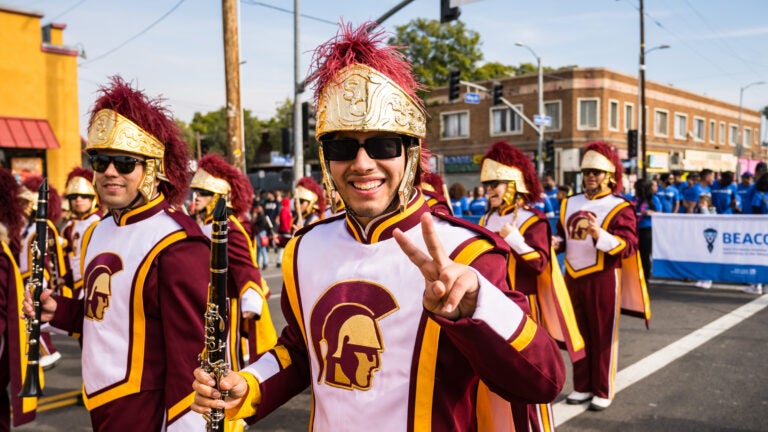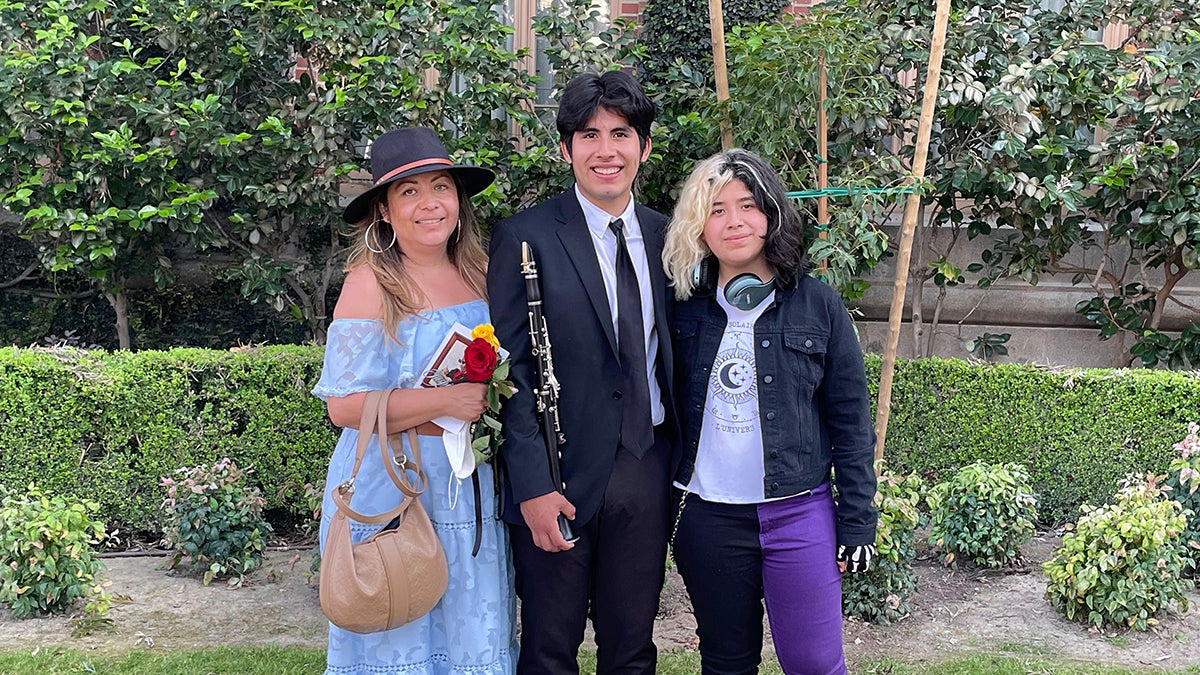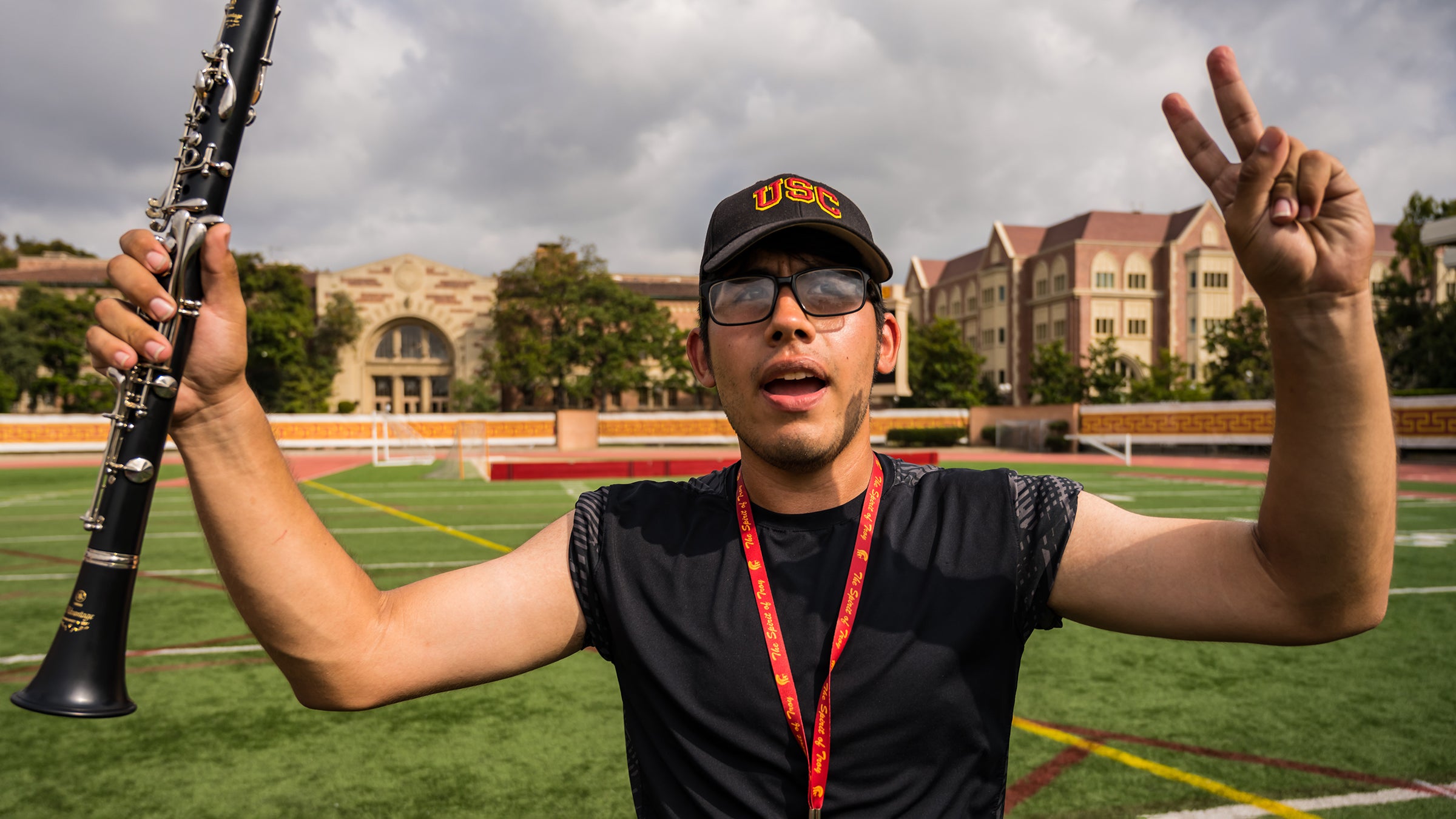
Giancarlo Ceja participates in the 2024 Martin Luther King Day parade with the USC Trojan Marching Band. (Photo/Courtesy of Benjamin Chua)
USC marching band section leader’s fight for climate justice is personal
Giancarlo Ceja is determined to advocate for low-income neighborhoods affected by rising temperatures and pollution.
Growing up in Corona, on the western edge of the Inland Empire, Giancarlo Ceja witnessed firsthand how marginalized communities feel disproportionate impacts from pollution and climate change.
“I noticed things in terms of environmental justice that were off,” he said. “There are fewer trees in my community compared to richer neighborhoods, and there is a lot more asphalt, so it is a lot hotter.”
The first in his family to earn a high school diploma, Ceja now boasts a bachelor’s degree in environmental studies and international relations, with a minor in web technologies and applications, from the USC Dornsife College of Letters, Arts and Sciences. He combined his studies with an array of relevant work experience — and yet still found time to serve as a section leader for the USC Trojan Marching Band.
As a member of the second class of fellows at USC Environmental Health Centers’ EH MATTERS program, Ceja helped develop an independent project to study of urban heat islands in his home county of Riverside. The phenomenon occurs when cities, with their dense concentrations of pavements and buildings, experience temperatures far above those recorded in nearby rural areas.
Passion for the environment
“When you hear about environmental injustices, you don’t think of Riverside or the Inland Empire,” Ceja said. “I think a lot of people gloss over that area. To have people within USC interested and do something for my community was really heartwarming.”
Ceja’s passion for the environment led him to USC’s Global Fellows Internship Program and an opportunity to work in Seoul, South Korea, where he supported a startup called aweXome Ray with outreach for its air-purification technology.

“I’m a kid who didn’t have travel opportunities growing up,” he explained. “The only place I went to was Mexico, and not to vacation in Cabo [San Lucas], but to help the family in Tijuana. So, when I got the opportunity to go to South Korea fully funded by the program and have an environmental justice experience, it was amazing.
“The company I was placed with let me take full rein in terms of their international development and their English-speaking outreach,” he added. “ I was the person directly communicating with economic development organizations and other government entities in the United States.”
Back in the States, Ceja got a chance to study the inner workings of government through internships at the Los Angeles district office of U.S. Rep. Jimmy Gomez, whose district includes Los Angeles’ Boyle Heights, Eagle Rock and Koreatown neighborhoods, and with the U.S. Department of Transportation. He also completed an internship at the U.S. Geological Survey, where he helped organize the first International Invasive Species and Climate Change Conference.
While at USC, he conducted research through the USC Grant Program and worked as a policy intern with Heal the Bay. He completed a host of other internships and spent his final semester as an undergraduate in Australia at The University of Queensland researching how climate change affects migration in the Asia Pacific region and how climate anxiety is shaping Australian youth. The experience was made possible with support from the USC Gilman Scholarship program.
Ceja notes that the perspective he’s gained through his experiences at USC have made him determined to pursue environmental justice on a global scale. “I want to focus on international climate justice, making sure that communities just like mine — very low-income, usually migrants, usually ethnic minorities, usually disadvantaged — can be properly equipped with the resources to fight climate change,” he said.
Musical experience
When he was not studying and advancing environmental causes, Ceja proudly served as a section leader with the USC Trojan Marching Band, where he got the chance to play alongside the Red Hot Chili Peppers and the L.A. Philharmonic.

“I started playing the clarinet in the fifth grade after my mom got a form from my teacher saying that I should join the band,” he said. “Being a part of a marching band that people really look up to has been an amazing experience. It has given me a lot of travel opportunities; I have been to 12 states and performed for thousands of people and been on national TV.”
Ceja, who has plans to pursue a master’s in public policy and then a law degree, will soon be headed to Washington D.C., as part of the Congressional Hispanic Caucus Institute Public Policy Fellowship Program.
“This is exactly the realm where I would like work in the future,” he said. “I want to be part of a movement that helps to enact meaningful change, that helps protect people that are most at risk from climate change. I want to help influence and draft policy.”



